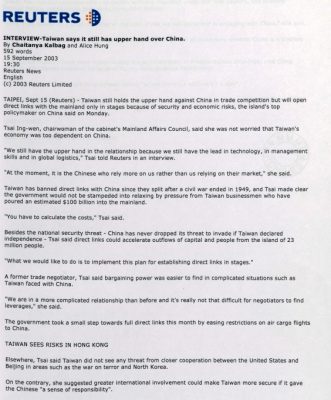INTERVIEW-Taiwan says it still has upper hand over China.
[Reuters]
Published date: 15th Sep 2003
15 September 2003
Reuters News
English
(c) 2003 Reuters Limited
TAIPEI, Sept 15 (Reuters) – Taiwan still holds the upper hand against China in trade competition but will open direct links with the mainland only In stages because of security and economic risks, the island’s top policymaker on China said on Monday.
Tsai Ing-wen, chairwoman of the cabinet’s Mainland Affairs Council, said she was not worried that Taiwan’s economy was too dependent on China.
“We still have the upper hand in the relationship because we still have the lead in technology, in management skills and in global logistics,” Tsai told Reuters in an interview.
“At the moment, it is the Chinese who rely more on us rather than us relying on their market,” she said.
Taiwan has banned direct links with China since they split after a civil war ended in 1949, and Tsai made clear the government would not be stampeded into relaxing by pressure from Taiwan businessmen who have poured an estimated $100 billion into the mainland.
“You have to calculate the costs,” Tsai said.
Besides the national security threat – China has never dropped its threat to invade if Taiwan declared Independence – Tsai said direct links could accelerate outflows of capital and people from the island of 23 million people.
“What we would like to do is to implement this plan for establishing direct links in stages.”
A former trade negotiator, Tsai said bargaining power was easier to find in complicated situations such as Taiwan faced with China.
“We are in a more complicated relationship than before and it’s really not that difficult for negotiators to find leverages,” she said.
The government took a small step towards full direct links this month by easing restrictions on air cargo flights to China.
TAIWAN SEES RISKS IN HONG KONG
Elsewhere, Tsai said Taiwan did not see any threat from closer cooperation between the United States and Beijing in areas such as the war on terror and North Korea.
On the contrary, she suggested greater international involvement could make Taiwan more secure if it gave the Chinese “a sense of responsibility”.
“China has to listen to what the international community has to say because they are so much involved in international affairs,” she said.
U.S. President George W. Bush came to office proclaiming China a “strategic competitor” and enraged Beijing by saying the United States would do “whatever it takes” to defend Taiwan. But Sino-U.S. ties are now warming.
On the recent political turmoil in Hong Kong over the government’s attempts to introduce a Chinese-style security bill, Tsai said China’s credibility was at stake.
Taiwan has rejected repeated offers to reunify with the mainland under the “one country, two systems” formula Beijing used to take back Hong Kong from Britain.
“Hong Kong serves as a good reminder of the kind of risk we will encounter in engaging with China,” she said.
“We are watching the developments there closely because we want to make sure whether China is a credible body to deal with.”
Cross-strait relations have been frozen during the administration of President Chen Shui-bian, who China regards with intense suspicion because of his pro-independence background.
But Tsai said there was hope for progress, saying “where there’s a will there’s a way”.
“If the political enviornment is right, and both sides have that kind of will, we will be able to come up with the solution,” she said.






